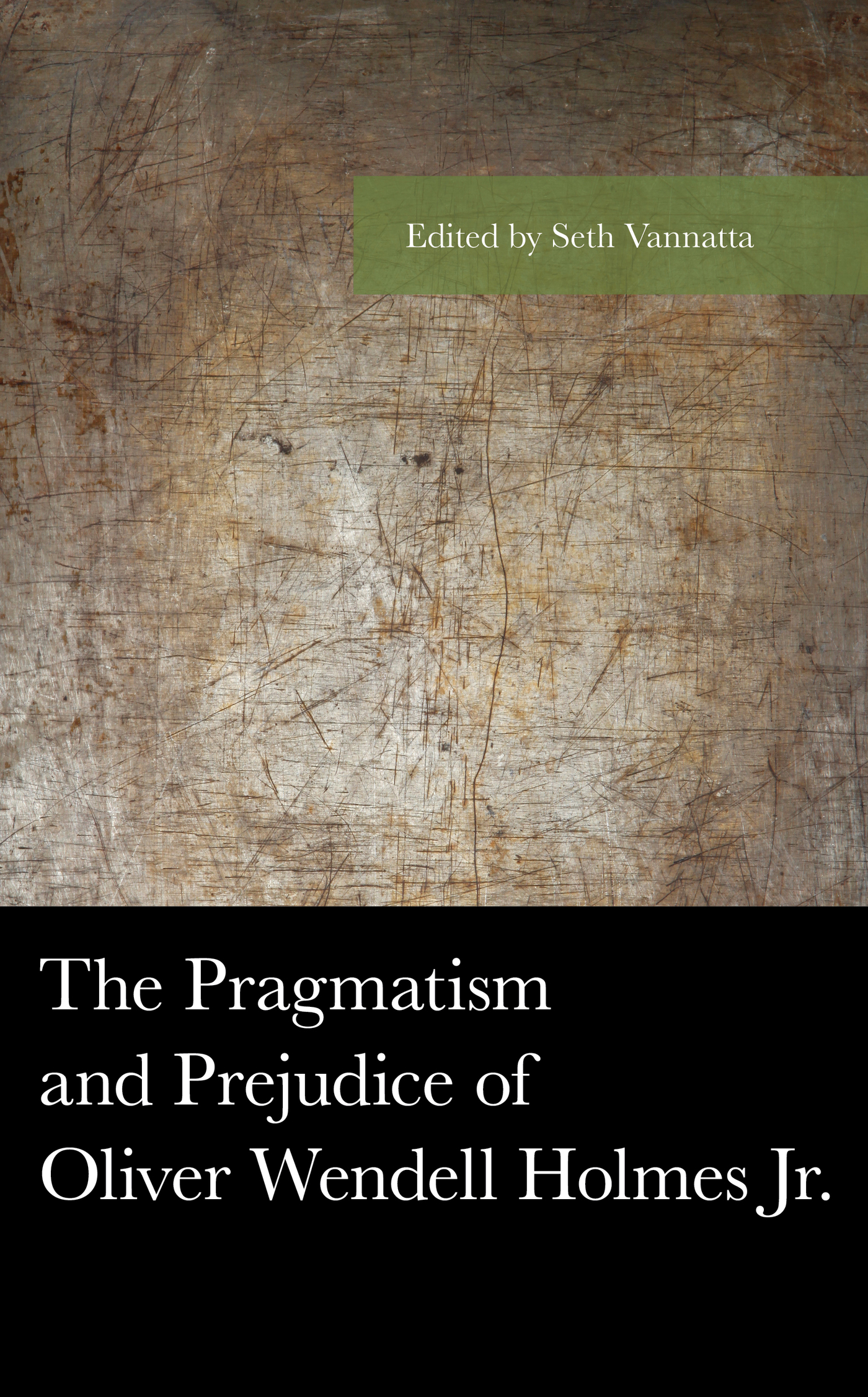The Pragmatism and Prejudice
of Oliver Wendell Holmes Jr.
American Philosophy Series
Series Editor: John J. Kaag, University of Massachusetts Lowell
Advisory Board: Charlene Haddock Siegfried, Joe Margolis, Marilyn Fischer, Scott Pratt, Douglas Anderson, Erin McKenna, and Mark Johnson
The American Philosophy Series at Lexington Books features cutting-edge scholarship in the burgeoning field of American philosophy. Some of the volumes in this series are historically oriented and seek to reframe the American canons primary figures: James, Peirce, Dewey, and Du Bois, among others. But the intellectual history done in this series also aims to reclaim and discover figures (particularly women and minorities) who worked on the outskirts of the American philosophical tradition. Other volumes in this series address contemporary issuescultural, political, psychological, educational
using the resources of classical American pragmatism and neo-pragmatism. Still others engage in the most current conceptual debates in philosophy, explaining how American philosophy can still make meaningful interventions in contemporary epistemology, metaphysics, and ethical theory.
Recent titles in the series:
The Pragmatism and Prejudice of Oliver Wendell Holmes Jr., edited by Seth Vannatta
Richard Rorty and the Problem of Postmodern Experience: A Reconstruction, by Tobias Timm
Peirce and Religion: Knowledge, Transformation, and the Reality of God, by Roger A. Ward
William James, Moral Philosophy, and the Ethical Life, edited by Jacob L. Goodson
Epistemic Issues in Pragmatic Perspective, by Nicholas Rescher
Loving Immigrants in America: An Experiential Philosophy of Personal Interaction, by Daniel G. Campos
The Religious Dimension of Experience: Gabriel Marcel and American Philosophy, by David W. Rodick
Aesthetic Transcendentalism in Emerson, Peirce, and Nineteenth-Century American Landscape Painting, by Nicholas L. Guardiano
The Pragmatism and Prejudice
of Oliver Wendell Holmes Jr.
Edited by Seth Vannatta
LEXINGTON BOOKS
Lanham Boulder New York London
Published by Lexington Books
An imprint of The Rowman & Littlefield Publishing Group, Inc.
4501 Forbes Boulevard, Suite 200, Lanham, Maryland 20706
www.rowman.com
6 Tinworth Street, London SE11 5AL
Copyright 2019 by The Rowman & Littlefield Publishing Group, Inc.
Chapter 6 2019 by Catharine Wells.
Chapter 8 2019 by Susan Haack.
All rights reserved. No part of this book may be reproduced in any form or by any electronic or mechanical means, including information storage and retrieval systems, without written permission from the publisher, except by a reviewer who may quote passages in a review.
British Library Cataloguing in Publication Information Available
Library of Congress Cataloging-in-Publication Data Available
ISBN: 978-1-4985-6124-2 (cloth : alk. paper)
ISBN: 978-1-4985-6125-9 (electronic)
 TM The paper used in this publication meets the minimum requirements of American National Standard for Information SciencesPermanence of Paper for Printed Library Materials, ANSI/NISO Z39.48-1992.
TM The paper used in this publication meets the minimum requirements of American National Standard for Information SciencesPermanence of Paper for Printed Library Materials, ANSI/NISO Z39.48-1992.
Acknowledgments
I would first like to thank the contributors to this volume. I was honored that each of them agreed to contribute. Some have served as mentors to me. Collectively, to my mind, they have produced the very best scholarship on the work of Oliver Wendell Holmes Jr. Some have devoted their careers to this line of research. They were generous with their time and devoted to produce excellent chapters. I would also like to thank the Society for the Advancement of American Philosophy, the Atlantic Coast Pragmatist Workshop, the Law and Society Association, and the American Institute for Cultural and Philosophical Thought. Those institutions and associations provided valuable venues and occasions to receive helpful feedback on my work
in this book. Individually, I would also like to thank Marilyn Fischer and
Treavor Pearce for their helpful feedback on my chapter, and Sarah Woolwine, for agreeing to co-author it with me.
Introduction
Seth Vannatta
Do I contradict myself?
Very well then I contradict myself,
(I am large, I contain multitudes.)
Walt Whitman, Song of Myself
Perhaps Whitmans poetic lines could be applied to Oliver Wendell Holmes. His legacy is a contested one. Holmes is hailed as the author of the greatest book on law by an American, The Common Law, and one of the best single essays on the law by an American, The Path of the Law,
That said, Holmes is vilified by his critics. I imagine few scholars have presented papers on Holmes at academic conferences without hearing an audience member recite his infamous dictum, Three generations of imbeciles are enough, from his reviled Buck v. Bell decision, as a premise in an argument whose implied conclusion is a rejection of the entire academic argument presented.
In addition to hyperbolic praise and blame, Holmess scholarship eludes easy classification. His scholarly reputation and evaluations of him have evolved alongside the academic and political tastes of the times. Philosophy of law texts regularly include The Path of the Law in the section on legal realism. This is understandable since the realists were inspired by Holmess essay and his prediction theory of law. But this is a bit like referring to Martin Luther as a Lutheran, an anachronism. Louis Menand indicated in American Studies, Holmes has been called a formalist, a positivist, a utilitarian, a realist, a historicist, a pragmatist (not to mention a nihilist).
The authors in this volume seek to investigate the extent to which these labels are appropriate for Holmess philosophy. Each chapter investigates one label, analyzes the secondary texts that support the use of the term to characterize Holmess philosophy, and take a stand on whether or not the category is appropriate for Holmes in light of his career by assessing his judicial and non-judicial publications, including his books, articles, and posthumously published correspondences. The earlier chapters address Holmess worldview in general in terms of his takes on sense of self and his social and moral philosophy. Each succeeding chapter focuses more on his jurisprudence specifically. As the title of this volume suggests, the arc of Holmess career is long, but it bends toward pragmatism, and for this reason, each chapter builds to the final pay-off, the chapter by Susan Haack. That is, the thrust of the work as a whole leans toward the stand that Holmess scholarship demonstrates significant pragmatist themes in the vein of Charles Sanders Peirce, William James, and John Dewey, despite the various ways Holmes differs from these philosophers, and despite the occasionally disparaging remarks he made of them.
However, Holmess philosophy is certainly tinted by prejudices of time and place, of his Boston upbringing, his Harvard education, his Civil War experience, and his many years on the Supreme Court during industrial change and world war. Holmes, in the spirit of Edmund Burke and later Hans-Georg Gadamer, is transparent that prejudice is a part of interpretation and adjudication and a part of Holmess philosophy as a whole. As Holmes unpacks what constitutes experience in his first passage of

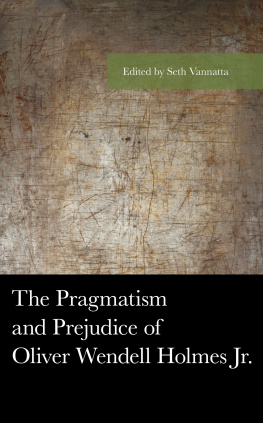



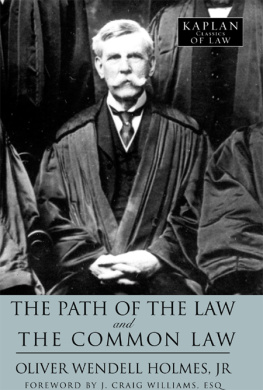
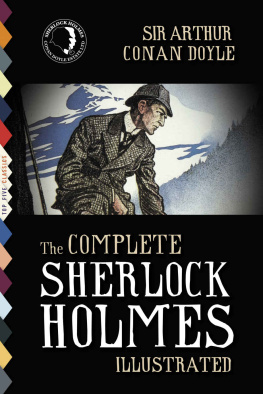
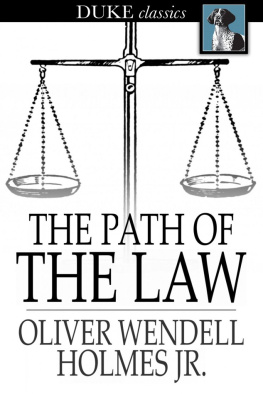
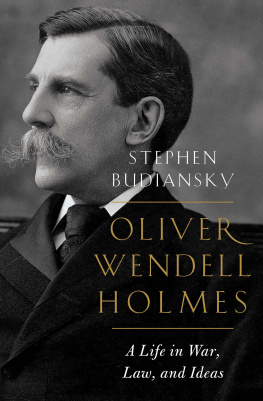
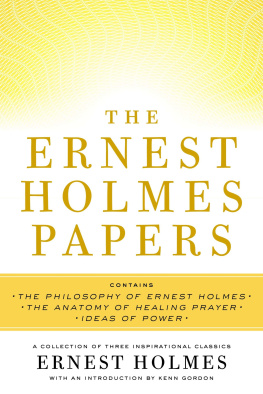
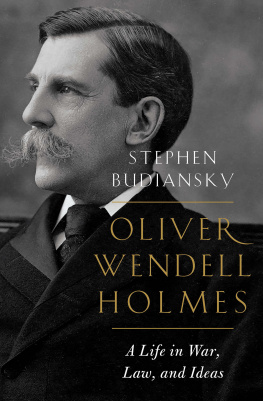
 TM The paper used in this publication meets the minimum requirements of American National Standard for Information SciencesPermanence of Paper for Printed Library Materials, ANSI/NISO Z39.48-1992.
TM The paper used in this publication meets the minimum requirements of American National Standard for Information SciencesPermanence of Paper for Printed Library Materials, ANSI/NISO Z39.48-1992.